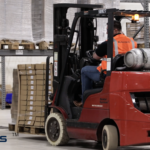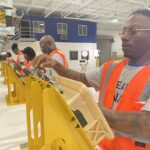
- Kim Kisner
- Business
- 07/25/2023
Natalie King Talks to SBN Detroit About the Impacts She’s Working to Create

Dunamis Clean Energy Partners LLC is a green-energy firm specializing in electric vehicle charger and LED lighting manufacturing; energy efficiency and energy management services; and environmental service solutions for municipal, commercial, and industrial clients. Owner and CEO Natalie King has led Dunamis to become a multimillion-dollar corporation with over 135 employees throughout Southeastern Michigan.
SBN Detroit interviewed King about the company, the vision, and Dunamis’ impacts.
Q: Tell us about Dunamis.
A: Essentially, it’s two companies – Dunamis Clean Energy Partners and Dunamis Charge.
I launched Clean Energy in 2012 as an energy-efficiency firm providing consulting services for energy management and solutions. We work with commercial and industrial properties, helping them to integrate energy-efficient solutions, reduce their carbon footprints and decrease operating costs.
I created Dunamis Charge in 2018, and we are focused on manufacturing best-in-class EV infrastructure products and charging stations. A focus here is economic development and job creation for underserved communities that are underemployed and have been historically impacted by environmental issues. Charge is a startup and is currently ramping up. I anticipate hiring 150 employees by 2025.
Q: How did the company originally come to be?
A: It’s been a 360 journey. I started in law in 1999 and thought I would end up as an environmental lawyer. But life happened, and I joined a firm that needed me in their corporate practice. But I always had a passion for the environment and how it impacts communities of color disproportionately.

Ultimately, it trained me for business and spurred my entrepreneurial spirit.
I had an opportunity to cofound a solar company in 2007, and I acted as general counsel. It reignited my interest in the energy field concerning the environment. I also did a lot of business development and loved it. Eventually, when it came time to shift, I did not want to go back to law, so I started Dunamis in 2012.
An overarching goal of mine is to bring opportunities to communities of color that may not even know anything about this space. I believe in being good at what I do while doing good. I felt I wanted to spread the message to underserved and underdeveloped communities that there is a great opportunity here.
Q: What services do you provide, and how have these evolved?
A: We started lighting manufacturing in 2015, and, ultimately, that’s how we developed the concept that we could do EV chargers. That experience with manufacturing.
We wanted to vertically integrate the company while doing energy auditing. Most times lighting is a component of the audits and we thought – why not come up with great solutions for our customers? So, our LED lighting product line is custom-built and project-oriented.
We began to drill down into lighting prospects for horticulture and focus on commercial growers, and we developed a highly efficient LED lighting solution for that industry.
In terms of our environmental side, we are a Tier 1 provider to DTE Energy. We also provide industrial cleaning services for power plants. It’s a pivot in our business and has helped growth and focus concerning clean energy technology.
We started Dunamis Charge in 2018 and have a 33,000-square-foot facility on the east side of Detroit that is outfitted and ready for production.
Q: How do you think these services impact Southeast Michigan businesses?
A: I think it’s important for Southeast Michigan to see representation that looks like our communities. I think our business impacts the entrepreneurs who have a dream but may not know how to get there. If someone is stepping out, he or she can see there is someone else who’s done it.
I believe that representation matters. An American-made product also shows we can compete with the world to create best-in-class products that are used around the world. We don’t have to source products from China or overseas, we have the ability, smarts, and talent to do it here.

The timing is impeccable because of the huge investment OEMs have made and the government is making in EV technology and infrastructure. We have the ability to innovate and create and build products like we’ve been doing for years – why not build the next legacy of products in Detroit? I’m hoping that is what Dunamis represents. I’m a city girl born and raised and educated in Detroit. We can breed talent here and create here and create jobs here for our community.
Q: Who are your customers?
A: DTE is our major customer, and Wayne State University and Bedrock on the energy management side. We work with a lot of small and midsized warehouses for energy auditing and lighting retrofitting.
Q: In what ways do you think Dunamis impacts sustainability in Southeast Michigan?
A: I believe we have played a great role in assisting our customer base by creating solutions that are not just typical solutions for energy efficiency. We’ve been able to provide comprehensive energy management services to our customers that change the way they operate as a whole. I’m very proud we’ve been able to provide this service.
In addition, our own footprint matters. We are located in Southeast Michigan and are committed to carbon neutrality. Everything we do, and all our vendors also have to have sustainability goals and sustainability practices concerning packaging, how they deliver, their systems, etc., to ensure we are reducing the carbon footprint in every aspect.
I’m hoping we can be an example here for municipalities, businesses, etc., to consider energy management solutions in every area.
Q: Being a native Detroiter, you talk about the importance of giving back to the city. How do you think your company does this?
A: It goes back to representation. Having representation as a minority-woman-owned company that has been built from the ground is important to me. And also, being a resource to others who may be motivated by that.

It also goes back to economic development and workforce development. I believe we are in a fourth industrial revolution right now. Trillions of dollars will be trading hands in upcoming years in the EV industry, and we want the city and the people to be able to participate in a multi-trillion-dollar wealth transfer. We don’t want Detroit to be left behind.
There is also a trickle-down effect. I hope our employees working at the plant are deciding their next car is going to be an electric vehicle and that they will then take it into their community, and their friends and families will become more interested. This accelerates the transition to EV adoption. I want to play a role at this grassroots level.
Q: What is the future for Dunamis?
A: Growth in all areas.
There are many expansive opportunities for the EV industry and Detroit. I’m excited about having the opportunity to represent Detroit and Southeast Michigan. I’m happy to play a part in that.
Kim Kisner
- All
- Business
- Community
- Education
- Events

Unique Monique Scented Candles, a Detroit-based business founded by Monique Bounds., aims to produce candles and household products with clean ingredients and local supply chains. What began as a personal hobby during college has evolved into a full-time venture producing coconut oil and soy-based candles made with essential oils and locally sourced materials. SBN Detroit interviewed Bounds about launching a sustainable product line, sourcing challenges in Michigan, and...

Eastern Market Partnership, in collaboration with the City of Detroit’s Office of Sustainability Urban Agriculture Division, has announced $240,000 in grant funding to support Detroit-based farmers and farmer collectives. The grants will advance food access, climate education, sustainable land use, and economic opportunity, with priority given to Black- and Indigenous-led farms, youth-led initiatives, and projects rooted in historically disinvested neighborhoods. The recipients – ranging from cooperatives and community...

Citizen Robotics is a Detroit-based nonprofit that advances the use of robotics and digital manufacturing in residential construction, focusing on improving productivity, sustainability, and long-term affordability. Best known for its early work in 3D-printed housing, it explores how alternative construction methods and new financial models can reduce material waste, lower lifetime operating costs, and enhance the resilience of homes. SBN Detroit interviewed Tom Woodman, founder and president of...







